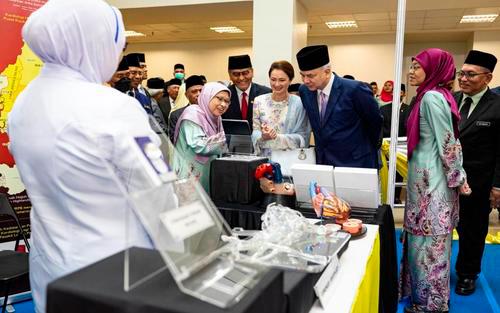IPOH: The Sultan of Perak, Sultan Nazrin Shah, today officiated the opening of the Women, Children and Cardiology Complex (KWKK) of the Raja Permaisuri Bainun Hospital (HRPB).
Sultan Nazrin was accompanied by Raja Permaisuri of Perak, Tuanku Zara Salim.
Also in attendance were Raja Muda of Perak, Raja Jaafar Raja Muda Musa; Raja Puan Besar of Perak, Raja Nazhatul Shima Sultan Idris A’fifullah Shah and Raja Di Hilir, Raja Iskandar Dzurkarnain Sultan Idris A’fifullah Shah.
Health Minister Datuk Seri Dr Dzulkefly Ahmad, Perak Menteri Besar Datuk Seri Saarani Mohamad and his wife Datin Seri Aezer Zubin were also present.
Meanwhile, Dzulkefly, in his speech said that, by having KWKK, HRPB is one of the three largest hospitals in Malaysia, after Kuala Lumpur Hospital and Penang Hospital.
He said that the hospital now boasted 1,394 beds, 22 operating theatres and 33 adult intensive care unit beds.
It was also equipped with 10 beds in the cardiac care unit, 12 beds in the Paediatric Intensive Care Unit (PICU) and 24 beds in the neonatal care unit.
“This complex was built at a cost of RM237 million, on an area of 14,671 square metres, under the 10th Malaysia Plan allocation.
“This is a large allocation in the expenses of a hospital, to ensure that health services can be implemented optimally for all Malaysians in general, and the state of Perak in particular,“ he said.
Dzulkefly said that KWKK offers health services from three main departments, namely the Department of Cardiology, the Department of Paediatrics and the Department of Obstetrics and Gynaecology, which are equipped with 404 beds, six operating theatres and 304 parking spaces for the use of staff and members of the public.
In addition, he said that the complex also provides three support services, namely Radiology, Pharmacy and the Sterile Material Supply Unit services to support the continuity of service provision in the building.
He added that Perak now has 15 hospitals, five of which are specialist hospitals; 88 health clinics; 73 dental clinics; 10 maternal and child health clinics; 222 rural clinics and 18 community clinics.
“Along with the development of the medical world, the government has provided many facilities to provide the best health services, of international standard,“ he said.
In addition, he said that the Ministry of Health is also working towards providing a more fair and equitable health system, of high quality, easy to access at a reasonable cost and sustainable for the long term, to meet the health needs of the people, as outlined in the Health White Paper.–Bernama









